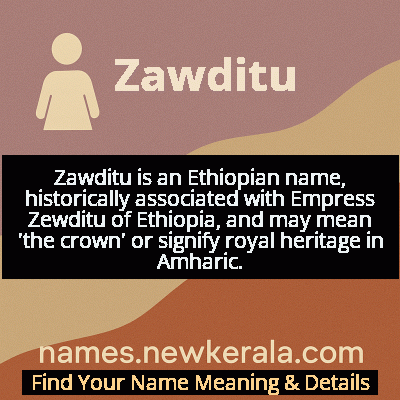Zawditu Name Meaning & Details
Origin, Popularity, Numerology Analysis & Name Meaning of Zawditu
Discover the origin, meaning, and cultural significance of the name ZAWDITU. Delve into its historical roots and explore the lasting impact it has had on communities and traditions.
Name
Zawditu
Gender
Female
Origin
African
Lucky Number
5
Meaning of the Name - Zawditu
Zawditu is an Ethiopian name, historically associated with Empress Zewditu of Ethiopia, and may mean 'the crown' or signify royal heritage in Amharic.
Zawditu - Complete Numerology Analysis
Your Numerology Number
Based on Pythagorean Numerology System
Ruling Planet
Mercury
Positive Nature
Adventurous, dynamic, curious, and social.
Negative Traits
Restless, impatient, inconsistent, prone to indulgence.
Lucky Colours
Green, white.
Lucky Days
Wednesday.
Lucky Stones
Emerald.
Harmony Numbers
1, 3, 9.
Best Suited Professions
Sales, marketing, travel, entertainment.
What People Like About You
Versatility, charisma, adventurous spirit.
Famous People Named Zawditu
Empress Zewditu
Monarch
First female head of an internationally recognized African empire and Ethiopia's only reigning empress
Zewditu Bekele
Academic
Ethiopian historian and professor specializing in African studies and women's history
Zewditu Tadesse
Healthcare Advocate
Founder of maternal health initiatives in rural Ethiopia, reducing childbirth mortality rates
Name Variations & International Equivalents
Click on blue names to explore their detailed meanings. Gray names with will be available soon.
Cultural & Historical Significance
In contemporary Ethiopia, the name continues to carry echoes of this imperial legacy while also representing national pride and cultural continuity. It serves as a living connection to Ethiopia's unique history as one of the few African nations to resist European colonization successfully. The name is particularly significant in the Ethiopian Orthodox Tewahedo Church context, where it evokes images of righteous leadership and spiritual authority. Families who choose this name often do so to honor both their personal heritage and the broader historical narrative of Ethiopian resilience and sovereignty.
Extended Personality Analysis
Individuals named Zawditu are often perceived as possessing natural leadership qualities, dignity, and a strong sense of responsibility. They tend to exhibit regal composure even in challenging situations, with an innate ability to command respect without being authoritarian. These individuals typically demonstrate wisdom beyond their years, showing careful judgment and thoughtful decision-making. Their 'crown' symbolism manifests in their approach to relationships and responsibilities—they often become the pillars of their families and communities, providing stability and guidance.
While they carry themselves with grace and formality when required, they also possess deep empathy and genuine concern for others' wellbeing. This combination of strength and compassion makes them natural mediators and trusted advisors in both personal and professional contexts. People with this name often display remarkable resilience, able to shoulder significant responsibilities while maintaining their emotional equilibrium. They tend to be tradition-conscious yet progressive, valuing their heritage while embracing positive change. Their leadership style is typically characterized by quiet authority rather than loud commands, earning them genuine loyalty rather than forced obedience.
Modern Usage & Popularity
In contemporary usage, Zawditu remains a respected but relatively uncommon name, primarily used within Ethiopian communities both in Ethiopia and throughout the global diaspora. The name has experienced a modest resurgence among educated, urban Ethiopians seeking to reconnect with their cultural heritage while honoring strong female figures from their history. While not among the most popular names in Ethiopia today, it maintains a special status as a 'heritage name' often chosen by families with historical awareness or royal connections. In Western countries with significant Ethiopian communities, such as the United States, Canada, and various European nations, Zawditu serves as a distinctive cultural marker that immediately identifies Ethiopian heritage. The name's usage patterns reflect a balance between preserving tradition and adapting to modern naming conventions, with some parents opting for the more phonetic 'Zawditu' spelling rather than the traditional 'Zewditu' to facilitate pronunciation in multicultural environments.
Symbolic & Spiritual Meanings
Beyond its literal translation, Zawditu carries rich symbolic meanings that extend far beyond royal connotations. The 'crown' represents not just authority but also the weight of responsibility, the circle of community, and the completion of one's potential. Symbolically, it suggests someone who carries themselves with inherent dignity regardless of their circumstances—a person who 'crowns' their family and community through their actions and character. The name also symbolizes the connection between past and present, serving as a living bridge between Ethiopia's imperial history and its contemporary identity. In a broader sense, Zawditu represents the idea that every person has the potential to be 'crowned' with purpose, wisdom, and the ability to positively influence their world. This makes it a name that inspires both the bearer and those around them to aspire toward their highest selves, embracing leadership not as privilege but as sacred responsibility to serve and uplift others.

